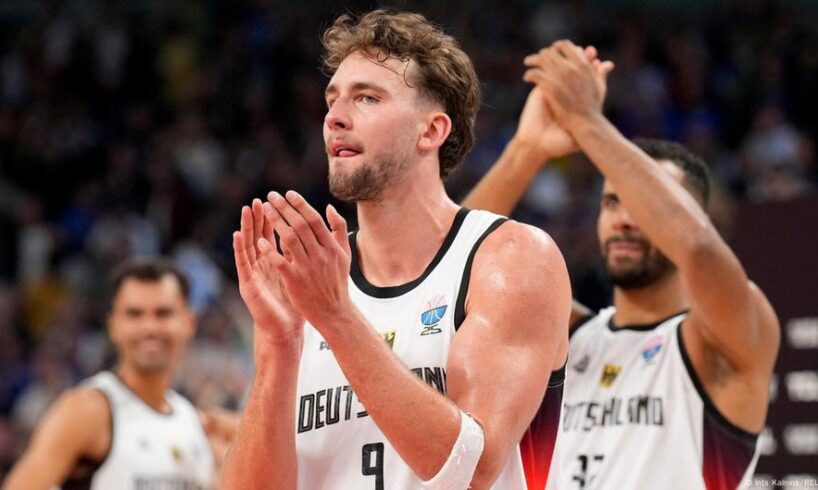
After Germany beat Turkey to win the Eurobasket crown on Sunday, there can be no doubt that the country is enjoying its greatest-ever era of basketball.
Just two years after winning the World Championship and one year on from Germany’s women winning gold in the 3×3 at the Paris Olympics, the glory days continued as NBA stars Franz Wagner and Dennis Schröder helped Germany take the EuroBasket. The success was Germany’s second-ever EuroBasket title, and Schröder was named the tournament MVP for his efforts.
While eight of the 12 players in Germany’s title squad play for professional teams abroad, including three in the NBA, domestic basketball in Germany has gone from strength to strength in recent years. The Basketball Bundesliga (BBL) has become one of the continent’s most stable and exciting domestic leagues, and German teams are slowly establishing themselves in European competitions, too.
But there are concerns that four years after colleges and universities in the United States introduced the NIL (Name Image Likeness) provision for student athletes, the landscape is rapidly changing for European basketball teams.
The impact of NIL on European basketball
After a long-standing resistance to allowing student athletes to profit from their own image, the dam was broken in 2021 when NIL was introduced. The policy allows US college athletes to earn money through sponsorships, endorsements and social media without affecting their amateur status.
As a result, amateurism, a longtime hallmark of US college sports, has slowly become a thing of the past. In June, the National Collegiate Athletic Association (NCAA), the organization that operates college sports, reached a settlement with the House of Representatives that allows colleges to pay their student-athletes directly.
The money on offer at many of the top sports colleges in the US is, in a basketball context, akin to the salaries in the EuroLeague, Europe’s top club competition. This is changing the entire structure of basketball development across Europe and poses serious challenges for the future of German basketball.
The BBL has the 6+6 regulation, which requires at least six German players to be on the 12-man roster. Robert Wintermantel is head of sports and finance for the Basketball Bundesliga (BBL). The former player was instrumental in implementing the rule and remains a staunch supporter of it even in the face of a changing landscape.
“Of course, some talented players are currently leaving clubs to join the NCAA. This will be a transitional phase because many of them will come back,” Wintermantel told DW. “I am definitely in favor of leaving the 6+6 rule as it is.”
Hannes Steinbach, a 19-year-old forward who last played for the Würzburg Baskets, is a great example. Just seven months after making his Bundesliga, he announced he was opting to play for Washington University, the same university German basketball legend Detlef Schrempf attended. Steinbach, one of the Germany’s most promising players, will not be the face of the new Bundesliga season, instead honing his craft on the other side of the world.
Hannes Steinbach (right) is one of the biggest talents in German basketball but has chosen to play in the USImage: Harry Langer/DeFodi Images/IMAGO
Wintermantel recognizes that talent leaving to the US presents a positive opportunity for young players to play, study and learn more of the American basketball mentality.
“I think these are all very positive things for the individual players, and as a league, we should not try to put obstacles in their way,” Wintermantel said.
Should US colleges compensate European clubs for players?
At the same time, Wintermantel also favors clubs receiving compensation for the players they develop.
“The clubs have excellently trained these players, and the league has also made an important contribution to this development by introducing standards in the youth sector.”
Robert Wintermantel (left) has been instrumental in creating the system in which German players have thrivedImage: G. Santemiz/Eibner/IMAGO
FIBA, basketball’s global governing body, is reportedly seeking to sit down with the NCAA to try to reach a deal regarding compensation for European clubs. Whether that is possible and what this might look like remains unclear.
“There is so much money in the NCAA system that a solution for training compensation must now be found together with FIBA,” Wintermantel said.
Part of the issue is; where would the compensation come from? There are over 360 division one colleges playing in 31 conferences. There isn’t one governing body to negotiate directly with.
Domestic basketball in danger?
Wintermantel described the development of basketball as “incredible” and said that the BBL has been growing steadily for decades. He admits that it is not ideal for the league to lose a talent like Steinbach, but that will not change the solid foundation that German basketball has built for itself.
“I believe we have a very good time ahead of us, as there are already many other exceptional talents who will follow in the footsteps of this golden generation. It is important for us that we are now a basketball nation that must be taken very seriously,” he said.
Wintermantel hopes the current boom in German basketball will lead to increased media coverage, which in turn would lead to more sponsorships — and more money. Then the BBL could offer more to keep players at home a bit longer or bring them back sooner.
“Basketball deserves it,” he said.
Edited by: Chuck Penfold





